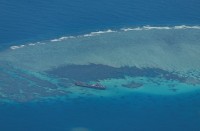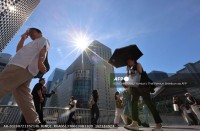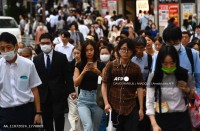by Danny Kemp
Agence France Presse
BRUSSELS, Belgium (AFP) — European Union leaders piled pressure on Russia on Thursday, urging the Kremlin to protect civilians in Syria while taking steps to save a historic cooperation pact with Ukraine and extending sanctions against Moscow.
At the final summit of one of the most turbulent years in the EU’s six-decade history, the bloc’s 28 leaders also discussed preparations for Britain to become the first nation to leave the bloc.
EU President Donald Tusk said they had agreed to push Syria, Russia and Iran using “all diplomatic means necessary” to open humanitarian corridors under international supervision for civilians in Aleppo.
But after a meeting in which the leaders heard an emotional plea from the mayor of besieged eastern Aleppo, Tusk acknowledged that the bloc was largely powerless to intervene.
“We know we are not effective enough. Unfortunately I know who is effective enough, not in humanitarian assistance but in bombing,” Tusk said.
German Chancellor Angela Merkel said the discussion on Syria was “very depressing” and that it showed the EU could not act politically in the way it wanted.
Brita Hagi Hassan, the local official in charge of eastern Aleppo, had earlier warned the leaders that “the 50,000 citizens of eastern Aleppo are only waiting for their deaths after the failure of the international community”.
No ‘present’ for Putin
The summit also discussed the migration crisis triggered largely by the Syrian conflict, with Tusk saying the EU planned a summit with Turkey in January to discuss a troubled deal with Ankara aimed at reducing the flow of refugees.
The EU’s impotence on Syria comes against a wider backdrop of how to deal with a resurgent Russia, particularly amid doubts about whether incoming US President Donald Trump may decide to cosy up to Russia’s Vladimir Putin.
But it flexed the only muscle it does have, renewing for six months damaging economic sanctions imposed against Russia in 2014 over the conflict in eastern Ukraine.
Tusk admitted that some EU countries had wanted a 12-month rollover but that it was never really an option.
Meanwhile, the EU leaders reached a deal with the Netherlands to stop the country torpedoing the bloc’s crucial association agreement with Ukraine, which Dutch voters rejected in a referendum in April.
Dutch Prime Minister Mark Rutte had warned that it would be the “biggest ever present” for Putin if it collapsed completely.
The EU agreed the cooperation pact and an associated free trade agreement with Ukraine in 2014 after pro-EU protestors ousted Russian-leaning president Viktor Yanukovych, who fled to Moscow.
But the EU leaders gave the Dutch guarantees that the pact was not a precursor to Ukraine’s membership of the union or to military aid for Kiev.
“It wasn’t easy, it wasn’t pleasant, but it is necessary, because it ensures that the EU can continue to form a united front against destabilising Russian foreign policy,” Rutte said after the agreement.
It must now go to the Dutch parliament ahead of elections in which Rutte faces a major challenge from populist parties.
Brexit talks
Near the end of the summit, Britain’s May left while the other 27 EU leaders briefly discussed the process for Britain’s departure, although a planned dinner for them was cancelled because time ran short.
The leaders said in a statement they had agreed to allow European Parliament representatives into preparatory talks for Brexit, after the assembly’s leader Martin Schulz warned that they could block an eventual deal if MEPs were frozen out.
The EU has rejected all negotiations until Britain officially triggers the two-year divorce process, expected in March but May said she did not feel she had been snubbed.
“It is right that the other leaders prepare for those negotiations as we have been preparing,” she said.
The British government separately rejected a report on Thursday that its ambassador to the EU had warned that it could take up to 10 years to agree a new trade deal after Brexit.
“This is the ambassador reflecting the views of others which have been put to him,” May’s spokesman said.
© 1994-2016 Agence France-Presse







